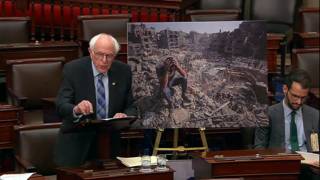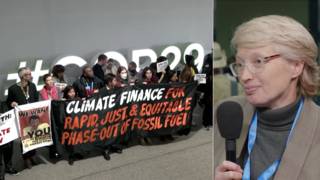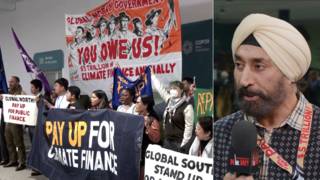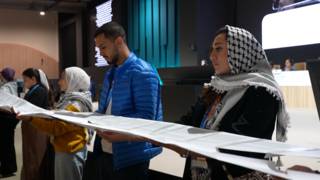
Related
Topics
Guests
- Devinder Sharmaaward-winning researcher, journalist, thinker and activist from India focusing on agriculture, biotechnology and trade policy in the Global South. Trained as an agricultural scientist, he is the author of GATT and India: The Politics of Agriculture, GATT to WTO: Seeds of Despair and In the Famine Trap.
The UN World Food Program is calling the current global food crisis “a silent tsunami of hunger.” This week the WFP warned that more than 40 million people will have their food rations reduced or eliminated because of drastic aid cuts. We speak with award-winning Indian journalist, writer and activist Devinder Sharma. [includes rush transcript]
Transcript
ANJALI KAMAT: We turn now to what the United Nations World Food Program has called a “silent tsunami of hunger.” It’s been described as the worst food crisis since the 1970s. According to the Food and Agricultural Organization, more than a billion people, or one-sixth of the world’s population, go hungry every day. Last year alone, thirty-seven countries experienced riots over skyrocketing food prices.
But the world’s richest nations have slashed their funding for food aid to their lowest levels in two decades. The World Food Program warned this week that more than 40 million people will have their food rations reduced or eliminated because of the drastic aid cuts. According to Josette Sheeran, the head of the World Food Program, wealthy nations, quote, “think the world food crisis is over, but in 80 percent of countries food prices are actually higher than one year ago.”
AMY GOODMAN: For more on the food crisis and the related crisis in agriculture, we’re joined now by an award-winning Indian journalist, writer, activist, Devinder Sharma. He closely monitors how international agriculture, biotechnology, trade policies negatively impact food security and farming communities in the Global South, in general, and in India, in particular. Trained as an agricultural scientist, he is the author of GATT and India: The Politics of Agriculture, GATT to WTO: Seeds of Despair and In the Famine Trap.
We welcome you to Democracy Now! “In the Famine Trap,” that’s what we’re talking about all over the world. Explain what the problem is, the scope of it.
DEVINDER SHARMA: Well, let’s be, first, very clear. You know, there is no shortage of food in the world. You know, we have about 6.7 billion people on the earth, and we produce food for 11.5 billion people. There’s no shortage. It’s only that one part of the world is eating more, and one part of the world is starving. And I think that’s a distribution problem, the critical problem that we need to address.
But then, in the process of all this, comes the issue of corporate control over food, the speculation that we see through future trading, which drives the prices high. The corporations make money; the poor people are deprived of food. So we see a kind of a nexus operating here. And as the World Food Program mentioned, you know, that there is a kind of a crisis that we see, number of hungry is multiplying. But I think what they refrain from saying is that it is because of the kind of agriculture that has been pushed into the world, especially now the developing world, that we are faced with the crisis. In fact, the crisis is going to exacerbate in the days to come. And that is my worry, and I think we are not drawing any lesson from where we have gone wrong.
AMY GOODMAN: What do you mean, corporate control of food?
DEVINDER SHARMA: Well, if you look at the way the global agriculture is determined now, the emphasis is like — look at America, the model of American agriculture. There are less than one percent of your population now is involved with agriculture. But America is a big player in international agricultural trade. So when America talks about agriculture, it talks about corporations, big machines and sophisticated technology and so on, which is producing food. And essentially that model is being pushed onto our countries. And the World Trade Organization, the IFIs and the kind of — the business — or the hedge funds and so on are actually pushing that model into the developing world, which means farmers have to be pushed out of agriculture. That is the new mantra, I would say, globally.
ANJALI KAMAT: Devinder, can you talk about this new phenomenon that’s expanded over the past year, has come to light in the past year? And you call that outsourcing food production.
DEVINDER SHARMA: Yeah.
ANJALI KAMAT: It’s been called the global land grab, food pirates. Explain what this is.
DEVINDER SHARMA: Well, I call it as food — I call them as food pirates for a simple reason. You know, it is shocking, and I think we are going back to the days of neocolonialism, because what is happening today is that companies, after the 2008 food crisis, realize even if they have money, they will not have food supplies, especially the Middle East countries. They realize that, you know, they had the petrol — money from petrol, but no food available off the shelf. So they have now decided to invest, so that, you know, they can produce food for domestic markets. So there is a scramble all over the world to go to Latin America, to Africa, to Asia, companies and the countries. And also, you know, Goldman Sachs and Morgan Stanley, they’re all investing the bailout funds to actually get into land grab now. And so, I see all over the world, roughly an area equivalent to Germany has already been leased out or purchased outrightly by these companies and these countries.
ANJALI KAMAT: And they’re using this to produce agriculture for whose benefit?
DEVINDER SHARMA: For domestic market. You know, let me give you an example. Ethiopia is one country that we always know has issues with starvation and hunger. There are five million people who live in hunger in Ethiopia. And you’ll be surprised. Eight thousand companies are vying for buying land in Ethiopia, including eighty from India. And the government of Ethiopia has already agreed that of the 2.7 million hectares that it wants to make available to these companies, this year they will make available roughly about 1.4 million. Now, that means the governments are in hand in glove.
In fact, there is — some weeks back, I was invited to a meeting, which, of course, has got postponed now. The African leaders are collaborating with the Middle East leaders, and they’re holding a kind of a conference to see how Africa and the Middle East can come together. From Middle East money, you can buy land and cultivate crops in Africa. For? Not for Africa, but for, you know, domestic consumptions back home.
AMY GOODMAN: Devinder, looking at the United Nations’ warning of millions of people now facing starvation because the world’s wealthiest nations have drastically reduced aid to the UN World Food Program, how does it work? Is it an effective tool? Why has the — how — why have these wealthy countries —-
DEVINDER SHARMA: Well, there are two opinions about it. First of all, I would say it is good that, you know, aid is getting reduced, because aid actually distorts the practices in the developing countries. Look at India, for instance. If we had gone on with the aid programs, I don’t think India would have been self-sufficient in food production. We would have been completely dependent, and that’s what the world wants us to be now. I think that the opportunity now is to see that Africa, mostly in military countries in Africa, are faced with the food crisis. I suppose the emphasis has to be on building up their capacity to produce food, and that can only happen if the aid from this part of the world is reduced effectively. And I personally feel that aid has -— aid is politically derived. You know, let’s not be forgetting that. Aid distorts the global prices. Aid also distorts the ability of a country to produce food.
So I think we have now — we should draw a lesson from the food crisis and try to evolve policies which can provide the kind of environment to the farmers within a country, also given the kind of a policy it makes, so countries can produce food within the country. And there, I think, we have to draw a lesson from India and China. We were once written off, if you remember. You know, both India and China, we thought one — at least half of India would be led to a slaughterhouse in the end of ’70s. But because of the domestic policies, when we, you know, closed our borders and we didn’t allow food imports to come in, then we gave a kind of a right incentive to farmers to produce more. And the rest is history. I think that is what Africa needs to do now, rather than go on depending upon aid, which will of course be of interest to these countries, the rich countries.
ANJALI KAMAT: Devinder, can you describe for our audience the situation for an average Indian farmer? We hear about farmer suicides. As many as nearly 200,000 farmers —-
DEVINDER SHARMA: That’s right.
ANJALI KAMAT: —- have committed suicide in the past decade.
DEVINDER SHARMA: Yeah.
ANJALI KAMAT: Can you explain this and the impact of American farming subsidies on Indian agriculture?
DEVINDER SHARMA: Well, India is a very sad case now, as far as agriculture is concerned. After being a seat of green revolution, we are faced with what I would call as a terrible agrarian crisis, the worst that at least we have seen in the living memory. What has happened now is the natural resource base, on which the technology was based, has been destroyed. And that has created all kinds of problems for the farmers, the entire equation going wrong.
In the last fifteen years, we have had about 200,000 farmers committing suicide. In fact, it’s very tragic that every hour, you know, two farmers commit suicide somewhere in India. Very pathetic scenario. And the government is not at all worried. We have had a number of commissions, and so on and so forth, but nobody wants to address the real issues, why the farmers are committing suicide.
Now, on the other hand, 40 percent of our farmers want to quit agriculture, given a choice, which means the entire focus, our entire effort of the governments all these years have been to really push farmers or to marginalize agriculture, and that is what is now quite visible. And, in fact, the government of India, on top of it, has also announced that we would like to transfer population from the rural to the urban areas in India. And let’s not forget, India has 600 million farmers. Every fourth farmer in the world is an Indian, twice the population of America. Now, what do you do with the 600 million farmers? I think that the challenge should be how to make agriculture more productive and sustainable and economically viable. But unfortunately, the mainline economic theory is, we don’t need farmers. You know, the corporations will produce food for us. And that is where, you know, as you asked me earlier, the role of corporations is coming in.
AMY GOODMAN: We just have thirty seconds, but the message you want to leave our audience with?
DEVINDER SHARMA: Well, two things. First of all, the kind of agriculture that we have here, the subsidy especially, you know, if the American farmers want subsidies, please have it. But if you want to trade simultaneously, please don’t do it, because your subsidies kill our farmers. And I think the message is: please leave us alone. If you want to trade, you can’t have the cake and eat it, too. So, please keep your subsidies, but don’t flood us with cheaper imports. This is what is happening all over the world. You know, the two parts of the world, America and the European Union, are becoming the biggest exporters, and developing countries are becoming food importers. And importing food, for us, is importing unemployment.
AMY GOODMAN: Well, Devinder Sharma, we want to thank you very much for being with us, award-winning researcher, journalist, activist.












Media Options